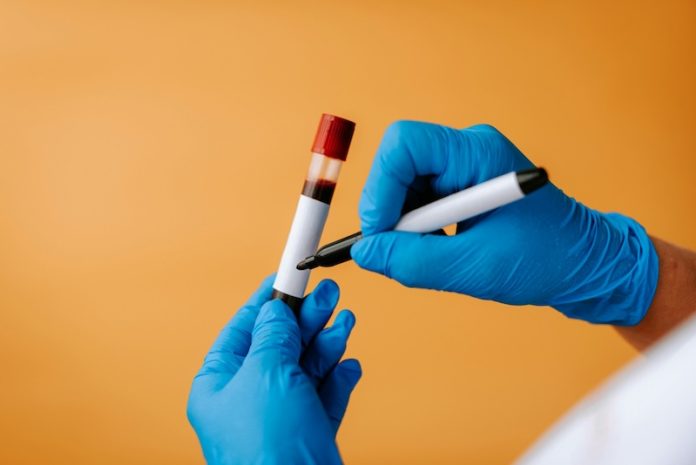
In Ireland, many people living with Alzheimer’s disease do not have a formal diagnosis. In fact, up to half of them remain undiagnosed. A new study suggests that a simple blood test could change this by making diagnosis easier, faster, and less invasive. This could help doctors identify the disease earlier, leading to better care and treatment for patients.
Currently, diagnosing Alzheimer’s requires a procedure called a lumbar puncture, also known as a spinal tap. This involves inserting a needle into the lower back to collect a sample of cerebrospinal fluid (CSF), which surrounds the brain and spinal cord.
While this test is effective, it is also invasive, uncomfortable, and not widely available. As a result, many people with early signs of Alzheimer’s do not get tested.
Researchers from Trinity College Dublin, the Tallaght Institute of Memory and Cognition, and St. James’s Hospital in Dublin are exploring a new alternative: a blood test called plasma p-tau217. This test could provide similar results to a lumbar puncture but in a much simpler way.
Their study found that this blood test was over 90% as accurate as the spinal tap method. If introduced into clinical practice, it could replace more than half of the lumbar punctures currently performed for diagnosing Alzheimer’s.
More than 60,000 people in Ireland live with dementia, and Alzheimer’s disease accounts for about 70% of these cases. Diagnosing Alzheimer’s as early as possible is crucial because it allows doctors to offer treatments and lifestyle advice that can slow down the progression of the disease.
It also helps patients and families plan for the future and access support services. However, because current testing methods are difficult and require specialized facilities, many people with early symptoms never get tested.
This study is one of the first in Europe to test the effectiveness of plasma p-tau217 in real-world conditions. The research involved 148 patients from Tallaght University Hospital who donated both blood and spinal fluid samples.
Scientists then compared the results from the blood test with those from the traditional lumbar puncture method. The study used an automated testing system called Lumipulse, which is already available in many hospital labs. This means the new test could be introduced without the need for expensive new equipment.
Dr. Jean Dunne, Chief Medical Scientist at St. James’s Hospital, explained that this test is not yet available in Ireland, but the research results could help bring it into hospitals in the future. She emphasized that accurate and reliable testing is essential to ensure patients receive the right diagnosis and care.
Dr. Adam Dyer, a specialist in geriatric medicine at Trinity College Dublin, highlighted the importance of this research.
He pointed out that the study used real-world patient samples and existing hospital equipment, which makes it easier to bring the test into regular medical practice. He also expressed gratitude to the 148 patients who contributed their samples to make this research possible.
Professor Seán Kennelly from the Tallaght Institute of Memory and Cognition believes this study is a major step forward in diagnosing Alzheimer’s disease. He explained that blood-based tests like plasma p-tau217 could make diagnosis more accessible and less stressful for patients.
If these tests become widely available, they could help detect the disease much earlier, leading to better treatment options and improved quality of life for those affected.
Analysis of the Findings
This study suggests that a simple blood test could soon replace the more invasive spinal tap for diagnosing Alzheimer’s disease. The key advantage of plasma p-tau217 is that it is over 90% as accurate as the current method while being much easier to perform.
Since the test can be done in routine hospital labs, it could make Alzheimer’s diagnosis available to more people, particularly those who would otherwise avoid testing due to fear or discomfort.
If this blood test is introduced in hospitals, it could lead to earlier diagnosis and treatment for many people who might otherwise go undiagnosed. This is crucial because early treatment can slow the progression of the disease and improve the quality of life for patients and their families.
However, before this test can be widely used, further steps are needed. Hospitals and healthcare providers must ensure that the test is reliable in different settings and that it meets international quality standards. Funding and support from health authorities will also be necessary to make the test available to patients.
Overall, this research represents a promising breakthrough. While it may take time for this test to become a standard part of Alzheimer’s diagnosis, the results offer hope for a future where detecting the disease is quicker, easier, and less stressful for patients and their families.
If you care about Alzheimer’s, please read studies about the likely cause of Alzheimer’s disease , and new non-drug treatment that could help prevent Alzheimer’s.
For more information about brain health, please see recent studies about diet that may help prevent Alzheimer’s, and results showing some dementia cases could be prevented by changing these 12 things.
The research findings can be found in Alzheimer’s & Dementia: Diagnosis, Assessment & Disease Monitoring.
Copyright © 2025 Knowridge Science Report. All rights reserved.



